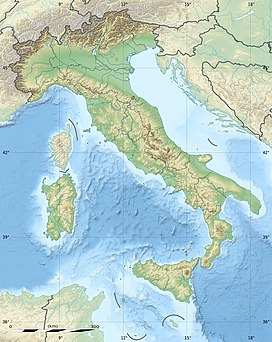Monte Bue
| Monte Bue | |
|---|---|
 The summit | |
| Highest point | |
| Elevation | 1,774.98 m (5,823.4 ft) |
| Prominence | 66 m (217 ft) |
| Isolation | 0.6 km (0.37 mi) |
| Coordinates | 44°33′21″N 9°29′34″E / 44.555945°N 9.492715°E |
| Geography | |
| Country | Italy |
| Province | Genoa Piacenza |
| Region | Liguria Emilia-Romagna |
| Parent range | Ligurian Apennines |
Mount Bue is a mountain in the Ligurian Apennines that is part of the Maggiorasca mountain group, located on the watershed between the Aveto, Ceno and Nure valleys, on the border between the metropolitan city of Genoa and the provinces of Parma and Piacenza, between the municipalities of Santo Stefano d'Aveto, Bedonia and Ferriere.[1][2][3] It is the second highest peak in the Ligurian Apennines, after nearby Mount Maggiorasca[4] and the highest peak in the province of Piacenza.[3]
The Ligurian side falls within the territory of the Aveto Natural Regional Park, while the Emilian side falls within the SCI Monte Nero, Monte Maggiorasca, La Ciapa Liscia.[5]
History
[edit]In the 1960s, a cable car capable of connecting Rocca d'Aveto, a hamlet of Santo Stefano d'Aveto, with the summit of the mountain was built on the Aveto side of the mountain, with an intermediate station at Prato della Cipolla. The lift was inaugurated in the winter of 1965, in the presence of Interior Minister Paolo Emilio Taviani.[6] With the construction of the ski lifts, a mountain hut was also built on the summit for the reception and overnight stay of tourists.[7] On the Parma side of the mountain, on the other hand, a ski lift was built to access the summit from Prato Grande dell'Anzola.[8]
The lift remained in operation until 1993 when, after a series of snowless winters starting in 1988, the Val d'Aveto Spa company, operator of the lifts, went bankrupt causing its closure, which also affected the refuge.[9]
In the summer of 2008, the Austrian company Doppelmayr began work on the construction of a two-seater chairlift from Rocca d'Aveto to Prato Cipolla.[9] Once the work was completed, the chairlift was inaugurated the following December 26.[10] The same company was later responsible for the construction of the second section of the chairlift, from Prato della Cipolla to the top of the mountain, which was inaugurated on October 9, 2010.[2] Following the reactivation of the lifts up to the summit, the hut located at the top of the mountain was also reopened in 2011.[11]
Description
[edit]
Mount Bue, located north of Mount Maggiorasca, from which it is separated by the Colletta Pass, is characterized by a vaguely pyramidal shape and a grassy summit. It is composed of resurfaced ophiolitic sandstones that are the origin of the mountain's smoother shapes compared to the neighboring mountain peaks generated by outcrops of basalts and peridotites.[4]
The summit of Mount Bue is the point where the ridge dividing the Aveto valley from the Ceno valley splits, giving rise to the Nure valley.[4]
On the slopes of the mountain, in the municipality of Ferriere, there is the Sacchi bivouac[12] and the short Mazzocchi ferrata,[13] while in the municipality of Santo Stefano d'Aveto there is a refuge at Prato della Cipolla.[7]
Tourism
[edit]On the Aveto side there is a ski resort, called Santo Stefano Ski Area with a ski lift, two chairlifts and a treadmill in service of the school camp where people can learn to ski.[14] The area also includes a ring for cross-country skiing.[7]
In summer, the area is popular for hiking and rock climbing, with the crags of Rocca del Prete, Mt. Maggiorasca, Waiting for Fred, and Dente delle Ali; these crags are characterized by the presence of often quite crumbly ophiolite.[12][15]
See also
[edit]References
[edit]- ^ "Comune di Ferriere". Archived from the original on 28 June 2017. Retrieved 8 September 2019.
- ^ a b Giacomo Campodonico (9 October 2010). "Santo Stefano, Ferriere e Bedonia alleati". Il Secolo XIX.
- ^ a b "Monte Bue". Retrieved 8 September 2019.
- ^ a b c "Monte Maggiorasca 1804 m- Monte Bue 1781 m - Monte Nero 1752 m". Retrieved 8 September 2019.
- ^ "IT4010003 - ZSC- Monte Nero, Monte Maggiorasca, La Ciapa Liscia". Retrieved 8 September 2019.
- ^ "La storia". Archived from the original on 22 February 2017. Retrieved 8 September 2019.
- ^ a b c "Info". Archived from the original on 20 September 2019. Retrieved 8 September 2019.
- ^ Fabio Guidoni (22 May 2010). "Monte Bue, un piano da 12 milioni". Il Secolo XIX.
- ^ a b "Santo Stefano d'Aveto riapre agli sciatori". Il Secolo XIX (in Italian). 2008-11-20. Retrieved 2024-07-18.
- ^ "Inaugurata la nuova seggiovia, rimasta ferma per il maltempo". Radio Aldebaran. 27 December 2008. Retrieved 19 August 2023.
- ^ "Rifugio Monte Bue". Archived from the original on 20 October 2020. Retrieved 8 September 2019.
- ^ a b "Bivacco Sacchi". Retrieved 8 September 2019.
- ^ "Ferrata Mazzocchi". Retrieved 19 August 2023.
- ^ "Inverno". Archived from the original on 8 September 2019. Retrieved 8 September 2019.
- ^ "Arrampicata: Rocca del Prete". 28 July 2010. Archived from the original on 11 September 2016. Retrieved 8 September 2019.
Bibliography
[edit]- Cartography
- Carta escursionistica Appennino Piacentino 2 - Val Trebbia e Val Nure, Infocartografica SCN e CAI Piacenza, scala 1:25.000, edizione 2021
External links
[edit]- "Monte Bue". Peakbagger.com.

